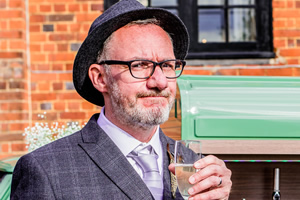The Latitude Attitude: arts curator Tania Harrison on juggling 14 stages interview
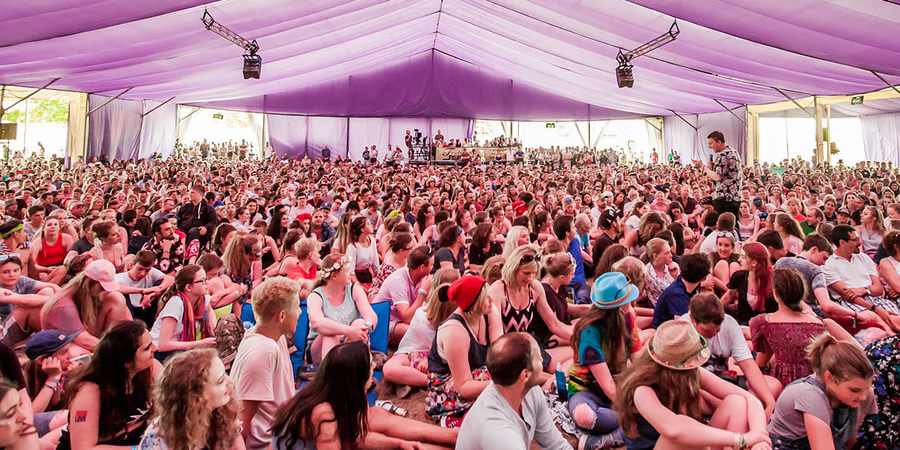
If you've ever driven round Suffolk in early July and noticed the yellow traffic signs warning about extra traffic because of a 'music festival' - well, that really isn't the half of it. Come away from Latitude thinking you've just been to a music festival and you haven't really done Latitude.
For a comedy nut in particular it's fascinating to see stand-ups infiltrating so many of the site's diverse stages. Moonlighting-comic highlights we caught this year included:
In the Literary tent: Mark Watson supposedly reading from his new novel but mainly commentating on Chvrches' set, which is drifting in from the main stage; Josie Long raging against Brexit during her late-night Book Shambles with Robin Ince; and Marcus Brigstocke stretching the 'literary' idea somewhat by staging a massive Prince party.
On the big Theatre stage: We somehow managed to miss Liam Williams' take on Twelfth Night, but did catch Mark Thomas' work-in-progress run-through of his seemed-pretty-finished-to-us new long-form masterpiece, The Red Door.
In the smaller Cabaret tent: tremendous character work from Lolly Adefope, who wins our unofficial Joke of the Festival award ("I mean, that's a whole continent" - you had to be there) plus varied stuff from Richard Gadd (previewing the thoughtful follow-up to last year's acclaimed Edinburgh show Waiting for Gaddot), Marcel Lucont, Goose and Aussie newcomer Sam Campbell, wearing a jaunty hat because "it's Cabaret."
And in the hefty Comedy arena itself: James Acaster making a terrific peppermint tea-based Brexit analogy before wading into the sizeable audience to confront an inebriated heckler with a dodgy leg (then stitching up the subsequent act, Josh Widdicombe, good and proper). And, actually, lots of music-related acts: The Boy with Tape on his Face, David O'Doherty, Bill Bailey, and the brilliant Reggie Watts, who could conceivably have been on the music stage.
It does make you wonder how exactly they work it all out. So once the dust had settled - and with a little hair-of-the-dog Latitude event coming up at London's National Theatre - we called the women with the plan: arts curator Tania Harrison.
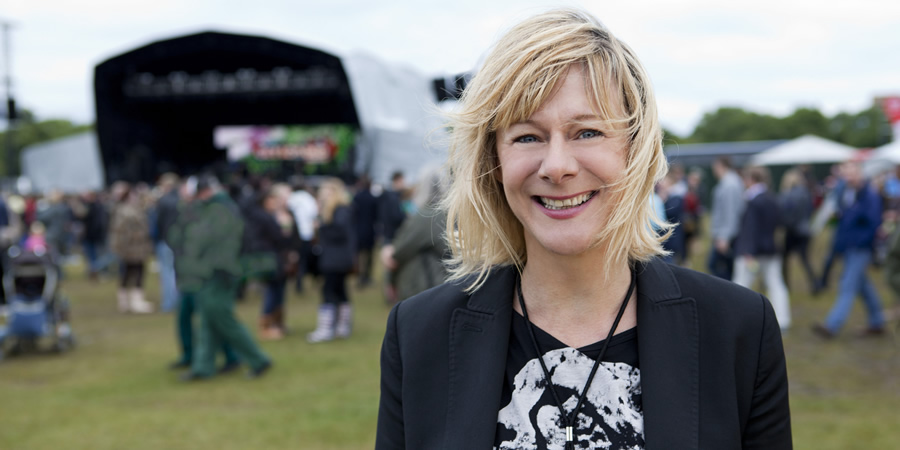
How are you feeling, Tania, nearly two weeks on?
Well, shattered really, because you work on it all year round - I had one weekend off in the last three months, trying to pull everything together. I think sometimes people think it's like Bill and Ted's [Excellent] Adventure, just book the bands and they will come - it's not quite like that.
So, yeah, it's pretty exhausting. Now I've got a mini Latitude at the National Theatre then the Reading and Leeds festivals. So you say all the thank-you's, work out the logistics as much as you can, then turn around the next one.
How did you end up doing this for a living?
I tried to be an actress and I always think it helps, understanding performers. It made a big difference, particularly across the arts, as it's different to staging a music gig: times, stage management. A band can adapt, but, say, a dancer can't cut steps out.
I worked part time when I was at drama school at the Jazz Café, and wanted a bit more control of my own life really, being an actress is quite stressful. So I ended up making my part time job my full time job, in music first, and I've been booking comedy at Reading, actually, since the previous century! How bizarre is that.
Something I've noticed at the Fringe in recent years is comedians spreading into the 'theatre' section, but at Latitude they're all over the place; in the Literary tent, the Film and Music tent, the Theatre stage, the Cabaret tent...
Well comics are writers aren't they, as well as performers, which extends in so many forms, which we fully embrace. So whether it's Marcus Brigstocke hosting Princefest, or Liam Williams writing and directing Travesty or rewriting Twelfth Night - it's working with the artists very specifically, then working out the best place for what they're doing.
The more I get to know the comics and performers, I can say 'what are you doing now, what are you working on?' Sara Pascoe, she's in the literary arena, as is Mark Watson, and Robin Ince in the Wellcome Trust hub with Dr Dean Burnett discussing the idiot brain, and also discussing the magic of Bowie in the Literary. It's trying to work with people as artists rather than boxing them in.
So it's you having that initial relationship with performers early on, then going with them as their careers evolve?
It is, and it's also about staging these shows, or talks, in the right environment - certain stages are right for certain shows. It's again going against that 'boxing in', that something has to be in a specific area. It's very important to understand what they want to achieve in the show and what it's about, and how it's presented. And the attitude of the audience.
Often people will say 'I want this to be in the Theatre arena' and you have to say 'No. The Theatre arena, that's much more about a stage set.'
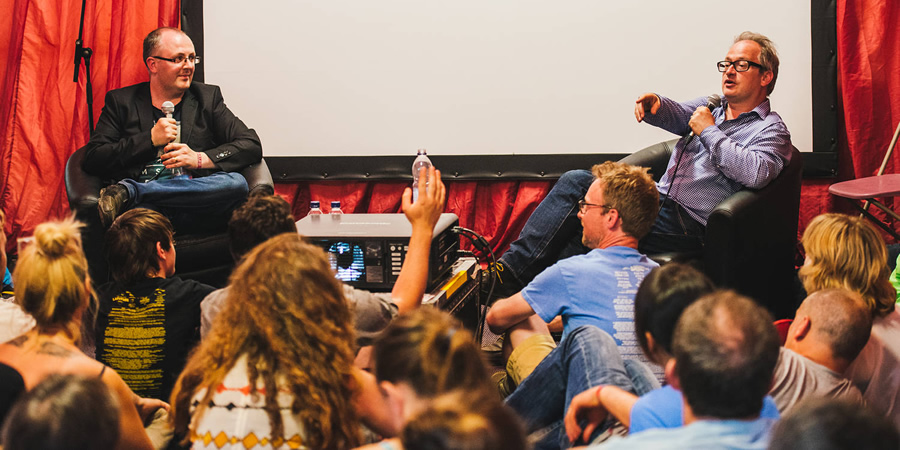
It's quite a big stage, too...
Sometimes you'll have big name comics doing their show in the Cabaret arena, just because that intimate environment fits perfectly with the show that they're doing, where the big space of the main Comedy stage might dilute it. It seems to work best with straight stand-up or musical stand-up in the Comedy arena.
You want a comic to have the best show they can possibly have. It's important, but agents don't always agree. That can be tricksy. But I'd rather the comic had the best show ever, where people really loved and wanted it, rather than being ok in the wrong room.
It's interesting at an outdoor festival - I walked in halfway through a fantastic set by Lolly Adefope in the Cabaret tent, but she was halfway through a character bit so I was totally confused at first.
I kind of love that. In Edinburgh, for example, people have made that decision already, you have to buy that ticket already, whereas one of the joyful things about Latitude, once you've bought a ticket you can try anything. You can go in and discover something.
After Lolly there was quite an interesting choice: my other half stayed in Cabaret for Marcel Lucont, while I headed over to Comedy for Reggie Watts. So have you actively looked at that and thought 'they'll attract different audiences'?
Yeah, different audiences. Because I programme 14 stages, it's quite difficult trying to think about who's going to see what, trying to find a trajectory. So for example on the New Order day [they headlined on Sunday] I had the Jane Horrocks show all about the Buzzcocks, New Order etc; trying to create things for different strands of audience.
So Reggie Watts, slightly different audience to Marcel Lucont, but it would also need to be a big act to go up against Reggie Watts, so then you're thinking 'if I've got that there, what do I put in the Literary to be different...? If I've got a family show here, I can do something different here' - it's quite a lot of juggling and moving around to get that right.
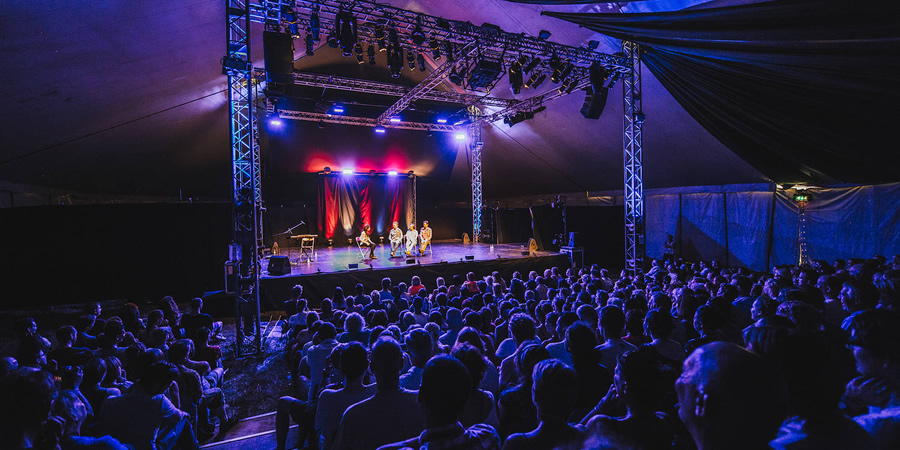
I'm sorting my Fringe review schedule at the moment and that takes some planning, so I can imagine your job sometimes becomes a... I don't want to use the word 'headfuck'...
No, I think we can safely use that word!
I imagine you staring at this massive calendar, banging your head against it, trying to avoid clashes?
It's really difficult. I did have one that I couldn't help [this year] - one of my comics had to move day, so I had Mark Steel up against Mark Thomas, which isn't ideal. But that rarely happens, and I try really hard not to make it so that the audience has such a clash.
It's funny, I had Louis Theroux on with Adam Buxton, in the Film and Music, because he just wanted to do something small. People were saying 'god I can't believe you've got him on in such a small arena' - but that's all he wanted to do. I did everything I could, we had speakers outside, we podcast it. But as you say it is a head, er, spin.
So how long does that whole process take?
I'm thinking about it all of the time - it takes a year. I try to confirm people and then confirm the times, usually people are pretty patient and trust me on it. [But] I always have one person each year that goes 'no that's not the right time, that's not what a festival audience do.' Which I find quite funny, because I think, 'yeeeeah, that's kind of my job - to know.'
They're used to a 7.30 show or something - but that's not how a festival audience moves. They have peaks and troughs throughout the day, so you have to also programme for that, different audiences have different energy levels.
I suppose you get to know how that works over the years...
It's quite interesting actually, because one of the peak engagement times is 11am on a Saturday morning - I had one very interesting 'discussion' shall we say, with an artist: 'nobody'll be fucking there, they'll all be in their tents!' And I'm saying 'no you know what, the sun comes up about seven, or six actually - they're really, really gagging at the bit, even if they've been up late.'
It's very interesting, the audiences, understanding them. So obviously you'll put big things on at one of the trough times, otherwise people wouldn't go if it was a smaller act. So you're trying to look after the acts as much as you can. But it is a science in itself.
Have you started sorting next year's line-up already?
Tonight I'm going to see Zoe Coombs Marr, who I desperately wanted but her times didn't work - I was pretty disappointed we couldn't make that work. I'm pretty obsessive you see, I want somebody so badly. My tenacity didn't work there, but it works for a lot of artists, I think they just get sick of me asking: 'Oh for god's sake...' If there's just a sliver of a window of opportunity I'm like 'yeah, yeah we can make this work, go on!'
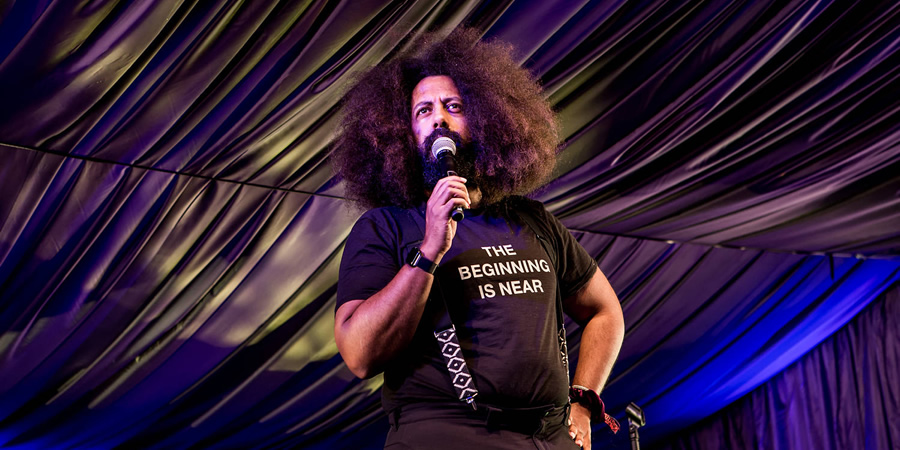
Stage times are a science: US star Reggie Watts was second on the bill, but performed at lunchtime
Latitude itself must be a pull, as artists want to actually go to the festival too.
I think so, there are so many brilliant people, it is nice to hang out and see each other's shows, and also a lot of good collaborations start in that artists' bar. People get a chance to get together, where they don't when touring round the country. There is that opportunity in Edinburgh, but this is a nice little thing before; you can properly hang out with other types of artists.
And Edinburgh can be pretty hellish and knackering for a lot of people, whereas Latitude is properly Festive.
Yeah, it's a beautiful site, there's lots to do. And once they've done their show they've got the rest of the weekend to have fun and hang out, whereas in Edinburgh you've got to get up every day and do it again.
Ever thought of giving this job up so you can just go and enjoy Latitude?
Yeah! Ha! It's exhausting, very hard work, and I know it's a wonderful job, but each year you're competing with yourself to make it even better. It's a lot, being out all the time, seeing shows. But I'm not complaining. I'm just tired.
It's pretty amazing, a whole year's planning for one weekend.
Yeah, but if you think of it as 300, or 500 shows, that's more than one a day across the year. Plus Reading and Leeds, plus the National Theatre event...
So that's a mini Latitude?
Yeah, on the River Stage outside the National Theatre on the fifth, sixth, seventh of August. It's a free festival so we've just picked some shows from Latitude: Tina C, Disco Shed, Nabakov, Pains Plough [who do the part gig/part theatre show A Little Bit of Luck], a bit of dance...
What I mean is that it's really intense, all that planning for one weekend, then you're relying on the weather or whatever... which I can kind of relate to as I'm getting married next year.
Yeah, its exactly like that - all that work, all that stress, making it feel so important, the biggest day of your life, then it'll be over before you know it. Actually we had a little wedding there this year, it seems to be a very romantic festival. People propose there, even conceive their children - they tell us everything! Wonderful things can happen.
For more details of Latitude's National Theatre River Stage shows visit: latitudefestival.com
Help us publish more great content by becoming a BCG Supporter. You'll be backing our mission to champion, celebrate and promote British comedy in all its forms: past, present and future.
We understand times are tough, but if you believe in the power of laughter we'd be honoured to have you join us. Advertising doesn't cover our costs, so every single donation matters and is put to good use. Thank you.
Love comedy? Find out more
